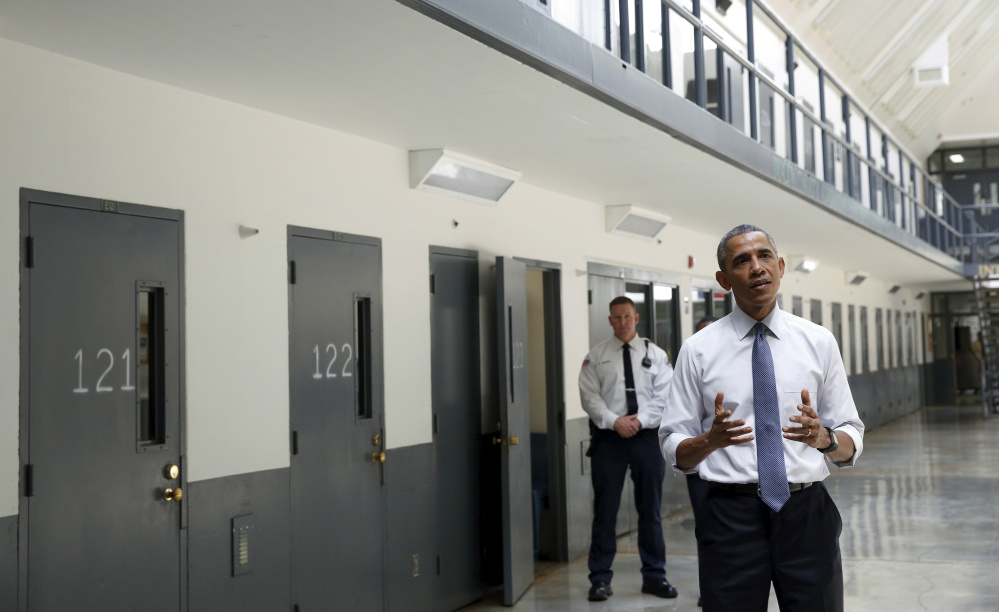WASHINGTON — The Justice Department should limit the types of cases it brings, and more nonviolent criminals should be steered toward probation and away from prison, according to task force recommendations designed to cut the federal inmate count and save more than $5 billion in the coming years.
The suggestions were released Tuesday amid a national dialogue across the federal government about overhauling the country’s criminal justice system, which critics say is overly expensive and has resulted in unduly long sentences for nonviolent drug criminals. A bipartisan effort to reduce the prison population appears stalled for the moment in Congress, although the White House and Justice Department have encouraged changes in how suspects are prosecuted and sentenced at the federal level.
The recommendations from the Charles Colson Task Force on Federal Corrections provide concrete steps that prosecutors, judges, prison officials and policymakers can take to reduce prison overcrowding and ease spending on a corrections system that has swelled in the past three decades as a result of harsh mandatory minimum sentences imposed on thousands of drug criminals.
Taken together, the proposals call for prison to be used sparingly as a punishment and for prosecutors and judges to avoid a “one-size-fits-all” approach.
“From severe overcrowding to an insufficient array of effective programs and incentives to encourage behavioral change, the system is failing those it incarcerates and the taxpayers who fund it,” said task force chairman J.C. Watts Jr., a former Republican congressman from Oklahoma.
Congress created the nine-member task force in 2014 to recommend changes to the multibillion-dollar federal corrections system, which annually gobbles up a large chunk of the Justice Department budget.
The task force described the system as in crisis, but said that if its six recommendations were implemented, there would be 60,000 fewer federal prisoners by fiscal year 2024 and more than $5 billion could be saved. More than 196,000 convicts are currently in Bureau of Prisons custody.
The proposals cut across the criminal justice system, calling for Congress to repeal mandatory minimum penalties for drug offenses – except for drug kingpins – and for judges to have greater discretion in sentencing, including by imposing probation and drug court instead of prison for nonviolent crimes.
The panel placed particular blame on mandatory minimum sentences for drug offenses, which typically dictate rigid punishments based on drug quantity, as driving a spike in the prison population since the 1980s. Nearly 80 percent of drug crime prisoners have no serious history of violence, and more than half had no violent history at all, it said.
“This task force has arrived at the conclusion that mandatory minimum sentences, particularly those for drug and weapons offenses, have imposed a one-size-fits-all sentencing model that does not serve the interests of public safety,” said task force vice chair Alan Mollohan, a former Democratic congressman from West Virginia.
In addition, the task force said, judges should be encouraged to deviate from mandatory minimum sentences for certain weapons offenses, such as cases in which the firearm was never brandished or fired.
It also recommended that the Justice Department limit the types of cases that it brings and ensure that “only the most serious cases” requiring specific expertise are prosecuted federally. But the panel acknowledged that matters such as white-collar crime, national security and immigration would continue to be handled by federal authorities.
The task force also urged the Bureau of Prisons to encourage participation in programs designed to prevent inmates from reoffending, including through incentives such as earned time credit. And it said the U.S. Sentencing Commission, which sets sentencing policy, should promote broader use of probation for non-violent crimes.
Attorney General Loretta Lynch called the recommendations important in an appearance Tuesday in New Orleans.
“The swelling number of inmates has maxed out our facilities, jeopardized our rehabilitation efforts and made it harder for correctional officers to safely and effectively do their jobs – which are already among the most difficult in law enforcement,” Lynch said.
Some of the actions, such as an overhaul of mandatory minimums, would require Congress to act – likely a longshot in an atmosphere in which a bipartisan effort to change the criminal justice system is in jeopardy.
But other steps, such as encouraging shorter sentences for nonviolent drug criminals, are in keeping with recent policy directives that the Justice Department has issued. Former Attorney General Eric Holder, for instance, directed prosecutors to limit their use of mandatory minimums as part of his 2013 Smart on Crime initiative.
President Obama has been willing to consider criminal justice revisions under his own authority, announcing on Monday night a ban on housing juvenile offenders in solitary confinement at the federal level.
Send questions/comments to the editors.




Comments are no longer available on this story